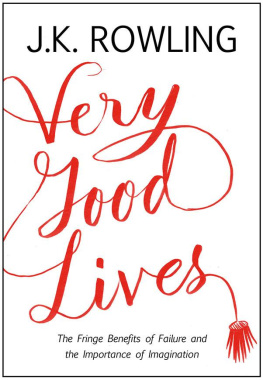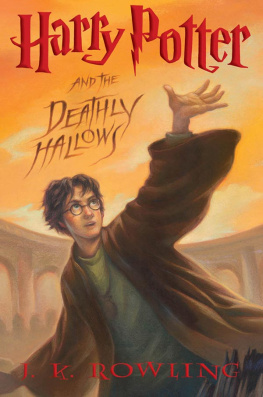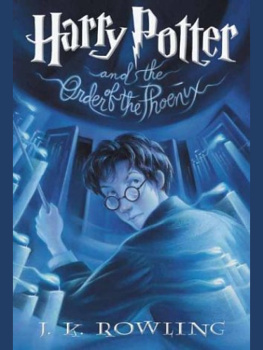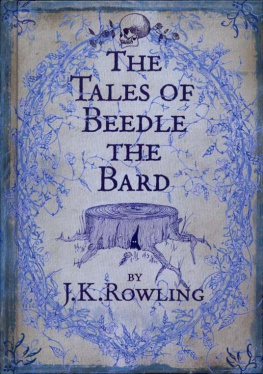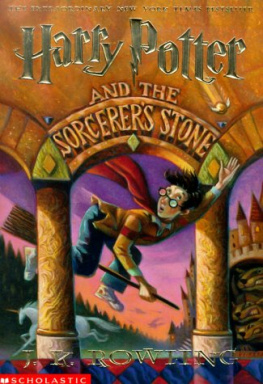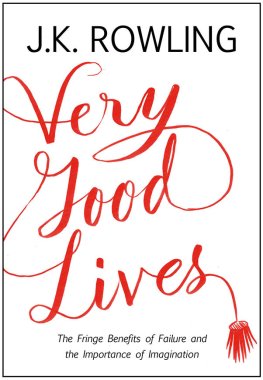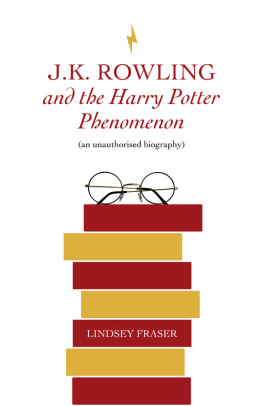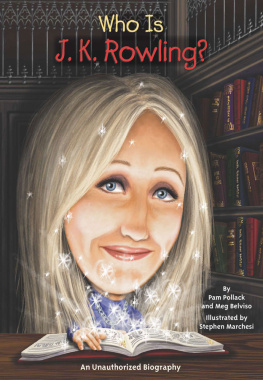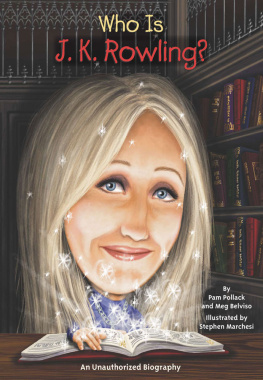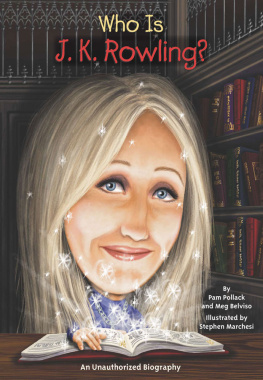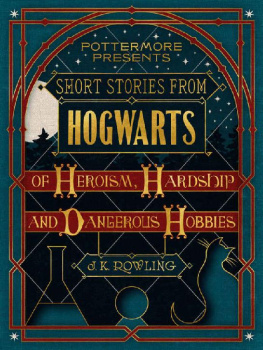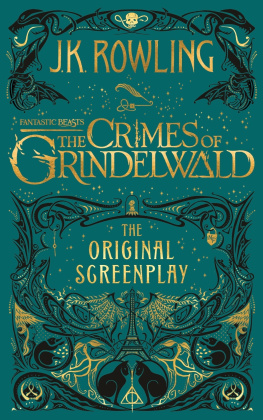Copyright 2008 by J.K. Rowling
Cover design by Mario J. Pulice
Cover art by Joel Holland
Cover copyright 2015 by Hachette Book Group, Inc.
All rights reserved. In accordance with the U.S. Copyright Act of 1976, the scanning, uploading, and electronic sharing of any part of this book without the permission of the publisher constitute unlawful piracy and theft of the authors intellectual property. If you would like to use material from the book (other than for review purposes), prior written permission must be obtained by contacting the publisher at permissions@hbgusa.com.
Thank you for your support of the authors rights.
Little, Brown and Company
Hachette Book Group
1290 Avenue of the Americas, New York, NY 10104
littlebrown.com
twitter.com/littlebrown
facebook.com/littlebrownandcompany
First ebook edition: April 2015
Published simultaneously in Great Britain by Little, Brown Book Group.
Little, Brown and Company is a division of Hachette Book Group, Inc. The Little, Brown name and logo are trademarks of Hachette Book Group, Inc.
The publisher is not responsible for websites (or their content) that are not owned by the publisher.
Book design by Mario J. Pulice
Illustrations by Joel Holland, 2015 by Little, Brown and Company
ISBN 978-0-316-36914-5
E3 President Faust, members of the Harvard Corporation and the Board of Overseers, members of the faculty, proud parents, and, above all, graduates.
thank
you
The first thing I would like to say is thank you. Not only has Harvard given me an extraordi nary honor, but the weeks of fear and nausea I have endured at the thought of giving this com mencement address have made me lose weight. A win-win sit uation! Now all I have to do is take deep breaths, squint at the red banners, and convince myself that I am at the worlds largest Gryffindor reunion.
Delivering a commencement address is a great responsibility, or so I thought until I cast my mind back to my own graduation. The commencement speaker that day was the distinguished British philosopher Baroness Mary Warnock. Reflecting on her speech has helped me enormously in writing this one, because it turns out that I cant remember a single word she said. This liberating discovery enables me to proceed without any fear that I might inadvertently influence you to abandon promising careers in business, the law, or politics for the giddy delights of becoming a gay wizard. You see? If all you remember in years to come is the gay wizard joke, Ive come out ahead of Baro ness Mary Warnock. Achievable goals: the first step to self improvement.
Actually, I have racked my mind and heart for what I ought to say to you today. I have asked myself what I wish I had known at my own graduation, and what important lessons I have learned in the twenty-one years that have expired between that day and this.
The
Importance
of
IMAgiNATiON
I have come up with two answers. On this wonderful day when we are gathered together to celebrate your academic success, I have decided to talk to you about the benefits of failure. And as you stand on the threshold of what is sometimes called real life, I want to extol the crucial importance of imagination.
UNEASY
BALANCE
These may seem quixotic or paradox ical choices, but please bear with me.
Looking back at the twenty-one-year old that I was at graduation is a slightly uncomfortable experience for the forty two-year-old that she has become. Half my lifetime ago, I was striking an uneasy balance between the ambition I had for myself and what those closest to me expected of me.
personal
quirk
I was convinced that the only thing I wanted to do, ever, was write novels. However, my parents, both of whom came from impoverished backgrounds and neither of whom had been to college, took the view that my overactive imagination was an amusing personal quirk that would never pay a mortgage or secure a pension. I know that the irony strikes with the force of a cartoon anvil now. So they hoped that I would take a vocational degree; I wanted to study English Literature.
A compromise was reached that in retrospect satisfied nobody, and I went up to study Modern Languages. Hardly had my parents car rounded the corner at the end of the road than I ditched German and scuttled off down the Classics corridor. I cannot remember telling my parents that I was studying Classics; they might well have found out for the first time on graduation day. Of all the subjects on this planet, I think they would have been hard put to name one less useful than Greek mythology when it came to securing the keys to an executive bathroom. I would like to make it clear, in parenthesis, that I do not blame my parents for their point of view. There is an expiration date on blaming your parents for steering you in the wrong direction; the moment you are old enough to take the wheel, responsibility lies with you.
What is more, I cannot criticize my parents for hoping that I would never experience poverty. They had been poor themselves, and I have since been poor, and I quite agree with them that it is not an ennobling experience. Poverty entails fear, and stress, and sometimes depression; it means a thousand petty humil iations and hardships. Climb ing out of poverty by your own effortsthat is something on which to pride yourself, but poverty itself is roman ticized only by fools. What I feared most for myself at your age was not poverty but failure. At your age, in spite of a distinct lack of motivation at university, where I had spent far too long in the coffee bar writing stories and far too little time at lectures, I had a knack for passing examinations, and that, for years, had been the measure of success in my life and that of my peers.
I am not dull enough to suppose that because you are young, gift ed, and well-educated, you have never known hardship or heartache. Talent and intelligence never yet inoculated anyone against the ca price of the Fates, and I do not for a moment suppose that everyone here has enjoyed an existence of un ruffled privilege and contentment.
So
high
have
you
already
flown
However, the fact that you are graduating from Harvard suggests that you are not very well acquainted with failure. You might be driven by a fear of failure quite as much as a desire for success. Indeed, your conception of failure might not be too far removed from the average persons idea of success, so high have you already flown.
I was the
biggest
failure
I knew
Ultimately we all have to decide for ourselves what constitutes failure, but the world is quite eager to give you a set of criteria, if you let it.
So I think it fair to say that by any conventional measure, a mere seven years after my graduation day, I had failed on an epic scale. An exceptionally short-lived marriage had imploded, and I was job less, a lone parent, and as poor as it is possible to be in modern Britain without being homeless. The fears that my parents had had for me, and that I had had for myself, had both come to pass, and by every usual standard I was the biggest failure I knew. Now, I am not going to stand here and tell you that failure is fun. That period of my life was a dark one, and I had no idea that there was going to be what the press has since represented as a kind of fairy-tale resolution. I had no idea then how far the tunnel extended, and for a long time any light at the end of it was a hope rather than a reality.
So why do I talk about the benefits of failure? Simply because failure meant a stripping away of the inessential. I stopped pretending to myself that I was anything other than what I was and began to direct all my energy into finishing the only work that mattered to me. Had I really succeeded at any thing else, I might never have found the determination to succeed in the one arena where I believed I truly belonged. I was set free, because my greatest fear had been realized, and I was still alive, and I still had a daughter whom I adored, and I had an old typewriter and a big idea. And so rock bottom became the solid foun dation on which I rebuilt my life. You might never fail on the scale I did, but some failure in life is inevitable.

